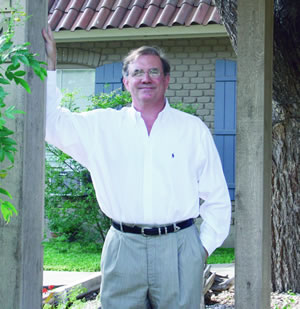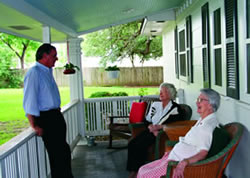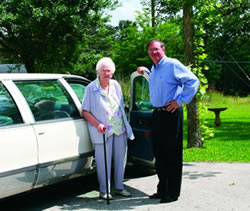Home Sweet Retirement Home
By Carla Maldonado

J.B. Gouger ‘97 MA, owner and founder of Assisted Residential Retirement of Texas
Working in a nursing home may seem a strange career move for someone who owned and operated restaurants for more than a decade. But getting certified as a nurse's aide made perfect sense to J.B. Gouger '97 MA because it provided him with the inside knowledge he needed to develop a new kind of retirement residence.
Gouger, who owns four retirement residences in Central and South Texas and is building a fifth, says his great uncle provided the inspiration for his business concept -- small but “homey” residences for the elderly located in small towns of Texas. But the nuts and bolts of making it happen were rooted in the education and mentoring he received as a UIW graduate student.
“My great uncle, who was 90 years old, lived in Bryan, Texas. He was frail as you might expect, but he didn't have any serious medical problems,” Gouger explains. “But that didn't matter to the manager of the apartment where he lived. The manager asked him to move out because he was elderly and considered a liability.”

Gouger chats with residents on the porch of his Gonzales home.
The only available option was to move his uncle into a nursing home even though he didn't need that level of medical care. His uncle simply needed to live where someone was available to help if he needed it.
“At the same time, my grandmother broke her hip and made my mother promise not to put her in an institutional environment. Since my grandmother had the means, she stayed home with around-the-clock nursing. But it was expensive,” Gouger remembers. “She spent about $150,000 a year on assistance alone -- and that was in the early 1990s. Not everyone can afford that.”
As he dealt with his family's situation, Gouger knew he wasn't alone. People age and it only made sense that other families would have similar problems finding an affordable yet comfortable place for their elderly family members to live -- especially if they were ambulatory and didn't need extensive medical care, just a helping hand.
So Gouger took his first step towards developing a model for what he called an “assisted residence” concept when he partnered with another businessman who had already developed some nursing homes. But Gouger says that he quickly realized they weren't on the same page; his partner wanted large numbers, while Gouger wanted to create something different, something that was a little more personal and closer to the feeling of home. He wanted his homes to be located in the middle of residential neighborhoods with a sense of community, and in small towns where living alternatives for the elderly were few.
He began developing his first residential-style retirement home in Uvalde in 1994 by purchasing and renovating an 8,000-square-foot building so that it would “live” like a large ranch house. In the evenings he attended classes as a graduate student in UIW's gerontology program. Gouger says that he thought the program, which is no longer offered, would provide the knowledge he needed for formulating an approach and helping his concept succeed.
“I didn't do that well as an undergraduate at the University of Texas at Austin. But now I was older, and I was interested in what I was doing,” Gouger says. “I wasn't going to UIW to get a job. I was there to learn how to do something that was close to my heart.”

Maggie Gibbons returns from a chauffeured trip to town. All of Gouger’s homes have their own limousine and driver.
He wasn't disappointed. Gouger says that he had many mentors along the way, including two of his former teachers. Sr. Margaret Rose Palmer helped him with his conceptualization. “She made me realize how important it was to get a clear idea in my mind of what my concept would be and how that concept would be different from those already existing.”
He also credits Sr. Anne Birmingham with helping him see how to get things done once he knew what he wanted to do. Birmingham, who had a ministry where she gave assistance to people at home, encouraged him to get his nurse's aide certification so he could get a first-hand view of what really happens in a nursing home. He also assisted in her ministry. By talking to the people he served, he says he found out what they needed and wanted.
“I got a well-rounded education in gerontology, conceptual as well as practical,” Gouger says. “Rather than approach this by developing a concept and trying to fit people in it, I found out what the older generation wanted and matched my business concept to their needs. I felt more confident in being able to go out there, set policy and administer a residence for the elderly. ”
One of the most important lessons he learned while working at the nursing home was that the staff worked hard to get things done, but did so at the expense of being “human.”
“They gave good care,” Gouger says, “but they didn't have time to socialize with the residents or help improve their social environment. The residents felt like they were being institutionalized, and no one wants that. Most people want to stay in their homes.”
That became his niche: to make sure his assisted residences were the next best thing to living at home. He also realized the homes needed to be small -- accommodating only 16 residents who were ambulatory -- and affordable.
Gouger says his concept is an economic risk because his homes don't have the commercial value of larger places. But it's rewarding because he knows he's providing a home that is much appreciated and that provides a higher life satisfaction than any other long-term care facility.
“Since the homes are small, it's easier for our staff to support our residents while also having the time to associate personally with them. It's a tight-knit family,” Gouger explains. “I also believe that I help keep people out of nursing homes longer. And a lot can be said about what these people do for each other. The residents thrive on their interaction with each other.”
Gouger says the residents' families like it too. They tend to visit more often because the homes are more intimate, so families feel like they are going to their parents' houses rather than to an institutional facility.
“I see my work as a ministry, so I do the best job I can. I feel good knowing that I provide a quality solution for a situation that doesn't have many alternatives. And just as important, I'm able to make living in retirement more affordable to a larger portion of the elderly market. In the long run, the residents who live in my homes are happy and that makes it work for me.”
For more information, visit www.txarr.com.
